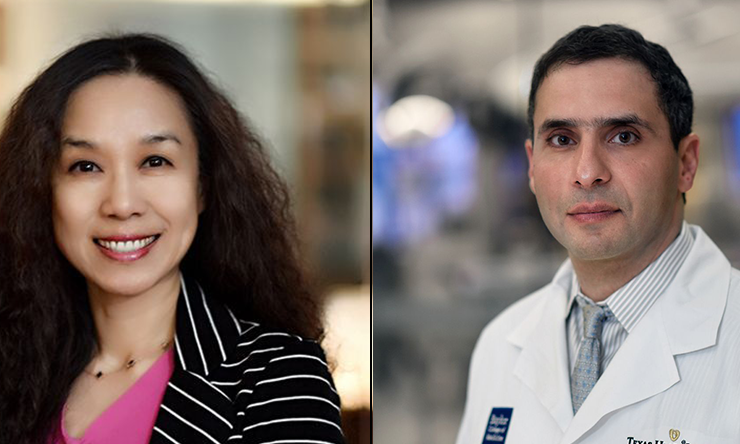Drs. Yao, Razavi named National Academy of Inventors fellows
Dr. Qizhi (Cathy) Yao and Dr. Mehdi Razavi of Baylor College of Medicine are two of the 168 academic inventors named fellows of the National Academy of Inventors today. The NAI Fellows Program highlights academic inventors who have demonstrated a spirit of innovation in creating or facilitating outstanding inventions that have made a tangible impact on quality of life, economic development and the welfare of society.
Cathy Yao
Dr. Qizhi (Cathy) Yao is a professor of surgery and of molecular virology and microbiology, pathology and immunology, and pharmacology at Baylor and a founding member of the Center for Translational Research on Inflammatory Diseases at Michael E. DeBakey Veterans Affairs Medical Center. Yao’s research focuses include virus-like particle-based vaccine development, molecular mechanisms of some key molecules that contribute to pancreatic cancer pathogenesis, and combinational therapies for pancreatic cancer.
Her inventions in vaccine platform technology have been applied to the new development of preventative measures and treatment therapies for HIV infection and pancreatic cancer. Her inventions of nanodelivery and miRNA platform technology have been applied to the development of new, targeted therapies for pancreatic cancer and ovarian cancer. These platform technologies have great potential for more applications toward the treatment of many diseases.
She holds 16 U.S. patents and three pending foreign patents that have been licensed to four companies. She is the founder of NanoIn, a start-up company. She has published 220 articles and four book chapters and serves as associate editor-in-chief for the journal Patient Preference and Adherence.
Mehdi Razavi
Dr. Mehdi Razavi is an associate professor of medicine – cardiology at Baylor and director of Electrophysiology Clinical Research & Innovations at the Texas Heart Institute. His research focuses on clinical trials assessing the efficacy of cutting-edge technology in the field of cardiac electrophysiology. Razavi has founded multiple medical device start-ups for the treatment of arrhythmia and other cardiovascular conditions and has 18 patents to his name.
Razavi currently leads a team that is exploring applications of carbon nanotube fibers for heart conduction repair. They also are working to develop a leadless and wirelessly powered pacemaker system. It uses energy from a battery pack that does not need to be implanted in the body. When the device shocks the patient, it uses less voltage and therefore involves less pain. His goal is to eventually replace harsh defibrillators and to instead painlessly shock the heart without the patient’s knowledge. Razavi’s team also is working with computer engineers at Rice University to harness the power of artificial intelligence and machine learning to develop algorithms for locating the precise areas to treat deadly arrhythmias.
Read more about Razavi's work with the Texas Heart Institute.
About the 2019 Fellows Class
The 2019 Fellow class represents 136 research universities and governmental and non-profit research institutes worldwide and collectively hold over 3,500 issued U.S. patents. They will be inducted at the Ninth Annual Meeting of the National Academy of Inventors in Phoenix on April 10, 2020.
The complete list of NAI Fellows is available.










